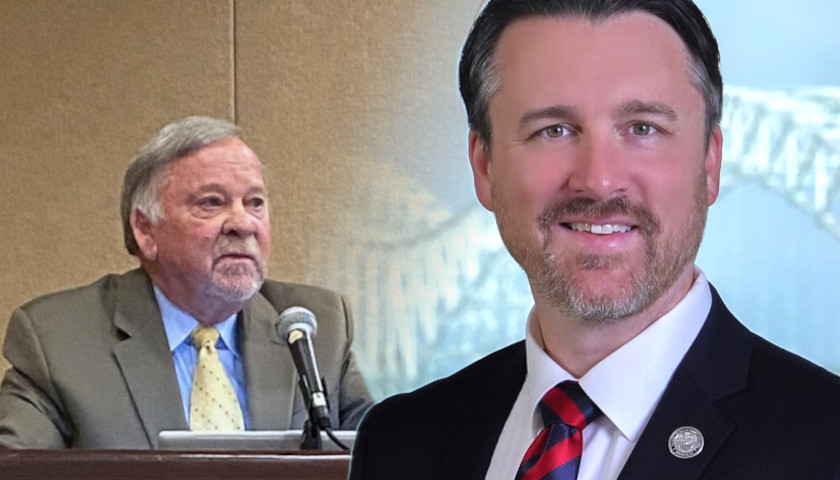The Shelby County Commission and Shelby County sued several pharmaceutical companies in Shelby County Circuit Court on Thursday, alleging illegal abuse in their manufacture, sale, and distribution of opioids.
“It’s not just the drug companies. It’s also the distributors, including pharmacies and the doctors writing the prescription that are being sued,” Heidi Shafer, chairman of the Shelby County Commission tells The Tennessee Star in an exclusive interview.
“The lawsuit is very narrowly tailored only to go after those who are abusing,” Shafer adds.
“About 80 counties around the country are already suing the companies involved in opioid abuse,” Shafer says.
Last month, President Trump declared the epidemic of opioid addiction to be a public health emergency.
“President Donald J. Trump is mobilizing his entire Administration to address drug addiction and opioid abuse by directing the declaration of a Nationwide Public Health Emergency to address the opioids crisis,” the White House said in a statement released on October 26.
“The lawsuit against several pharmaceutical companies was filed at 9 Thursday morning on behalf of the County, but the issue won’t go before the full County Commission until next week,”WREG reported:
Shelby County Mayor Mark Luttrell, who says his administration was already working on a plan, was blind sided by today’s announcement.
“They are not speaking as a voice for the County Commission. You have 4 of the county commissioners out of the 13 that [are] here today,” said Luttrell. “That has to be really initiated through the county attorney’s office and we would rely very heavily on the county attorney to give us the guidance we need legally to file a lawsuit.”
But Heidi Shafer tells WREG commissioners have been waiting on the Mayor to take action for two years and nothing has been done.
When she became chair, she used her authority under the county charter which says the chair can hire outside counsel at its own discretion.
“This case is about one thing: corporate greed,” the complaint begins.
“Defendants put their desire for profits above the health and well-being of Shelby County consumers at the cost of the Plaintiff,” it continues:
Shelby County spends millions of dollars each year to provide and pay for health care, services, pharmaceutical care and other necessary services and programs on behalf of residents of its County whom are indigent or otherwise eligible for services, including payments through services such as Medicaid for prescription opium painkillers (“opioids”) which are manufactured, marketed, promoted, sold, and/or distributed by the Defendants.
Shelby County also provides a wide range of other services to its residents, including law enforcement, services for families and children, and public assistance
In recent years, the County of Shelby has been forced to expend exorbitant amounts of money, described further below, due to what is commonly referred to as the “opioid epidemic” and as a direct result of the actions of Defendants.
The case then explains what the allegations of illegal conduct made against the Defendants.
“Defendants knew that opioids were effective treatments for short-term post-surgical and trauma-related pain, and for palliative (end-of-life) care. Yet they also knew – and had known for years – that opioids were addictive and subject to abuse, particularly when used long-term for chronic non-
cancer pain (pain lasting three months or longer, hereinafter referred to as “chronic pain”), and should there not be used except as a last-resort,” the lawsuit continues:
Defendants also knew that controlled studies of the safety and efficacy of opioids were limited to short-term use (not longer than 90 days), and in managed settings (e.g., hospitals), where the risk of addiction and other adverse outcomes was much less significant.
Prescription opioids, which include well-known brand-name drugs like OxyContin and Percocet, and generics like oxycodone and hydrocodone, are narcotics. They are derived from or possess properties similar to opium and heroin, which is why they are regulated as controlled substances.
Like heroin, prescription opioids work by binding to receptors on the spinal cord and in the brain, dampening the perception of pain. Opioids also can create a euphoric high, which can make them addictive. At certain doses, opioids can slow the user’s breathing, causing respiratory depression and death.
Despite this knowledge, the lawsuit maintains, the Defendants proceeded with an aggressive marketing plan designed to secure high levels of profit, with no concern for the associated public costs or the certainty that the improper use of the opioids they manufactured, distributed, sold, and prescribed would inevitably lead to an epidemic of addicts.
“In order to expand the market for opioids and realize blockbuster profits, Defendants needed to create a sea of change in the medical and public perception that would permit the use of opioids not just for acute and palliative care, but also for long periods of time to treat more common aches and pains, like lower back pain, arthritis, and headaches,” the lawsuit alleges:
Defendants, through a sophisticated and highly deceptive and unfair marketing campaign that began in the late 1990s, deepened around 2006, and continues to the present, set out to, and did, reverse the popular and medical understanding of opioids. Chronic opioid therapy — the prescribing of opioids to treat chronic pain long-term — is now commonplace.
To accomplish this reversal, Defendants spent hundreds of millions of dollars:
(a) developing and disseminating seemingly truthful scientific and educational materials and advertising that misrepresented the risks, benefits, and superiority of opioids long-term use to treat chronic pain;
(b) deploying sales representatives who visited doctors and other prescribers and delivered misleading messages about the use of opioids;
(c) recruiting prescribing physicians as paid speakers as a means to secure those physicians’ future “brand loyalty” and extend their reach to all physicians;
(d) funding, assisting, encouraging, and directing certain doctors, known as “key opinion leaders” (“KOLs”), not only to deliver scripted talks, but also to draft misleading studies, present continuing medical education programs (“CMEs”) that were deceptive and lacked balance, and serve on the boards and committees of professional societies and patient advocacy groups that delivered messages and developed guidelines supporting chronic opioid therapy; and
(e) funding, assisting, directing, and encouraging seemingly neutral and credible professional societies and patient advocacy groups (referred to hereinafter as “Front Groups”) that developed educational materials and treatment guidelines that were then distributed by Defendants, which urged doctors to prescribe, and patients to use, opioids long-term to treat chronic pain.
“These efforts, executed, developed, supported, and directed by Defendants, were designed not to present a fair view of how and when opioids could be safely and effectively used, but rather to convince doctors and patients that the benefits of using opioids to treat chronic pain outweighed the risks and that opioids could be used safely by most patients,” the lawsuit further alleges.
You can read the lawsuit, docket number CT-0004500-17, here.






[…] illegal abuse in their manufacture, sale, and distribution of opioids,” The Tennessee Star reported on November […]
[…] Tennessee chancery court judge ruled on Tuesday that the opioid abuse lawsuit filed by the Shelby County Commission earlier this month against several pharmaceutical companies, pharmacies, and distributors can […]
[…] Tennessee Star reported “The Shelby County Commission and Shelby County sued several pharmaceutical companies in […]
Well, they just had to do something because of the clamor over the drug problem no matter whether there is justification or not. Let’s get this straight. There would be no addiction problem if people did not abuse drugs. This is like suing the car manufacturers because everyone speeds resulting in some traffic deaths. Besides, Americans have proven that if the supply of one addictive drug is shut down they will just find some other drug to screw up their life. Obviously I am speaking in generalities here. There are cases where the provider is at fault but the overall problem is personal responsibility – something that many Americans do not exhibit.